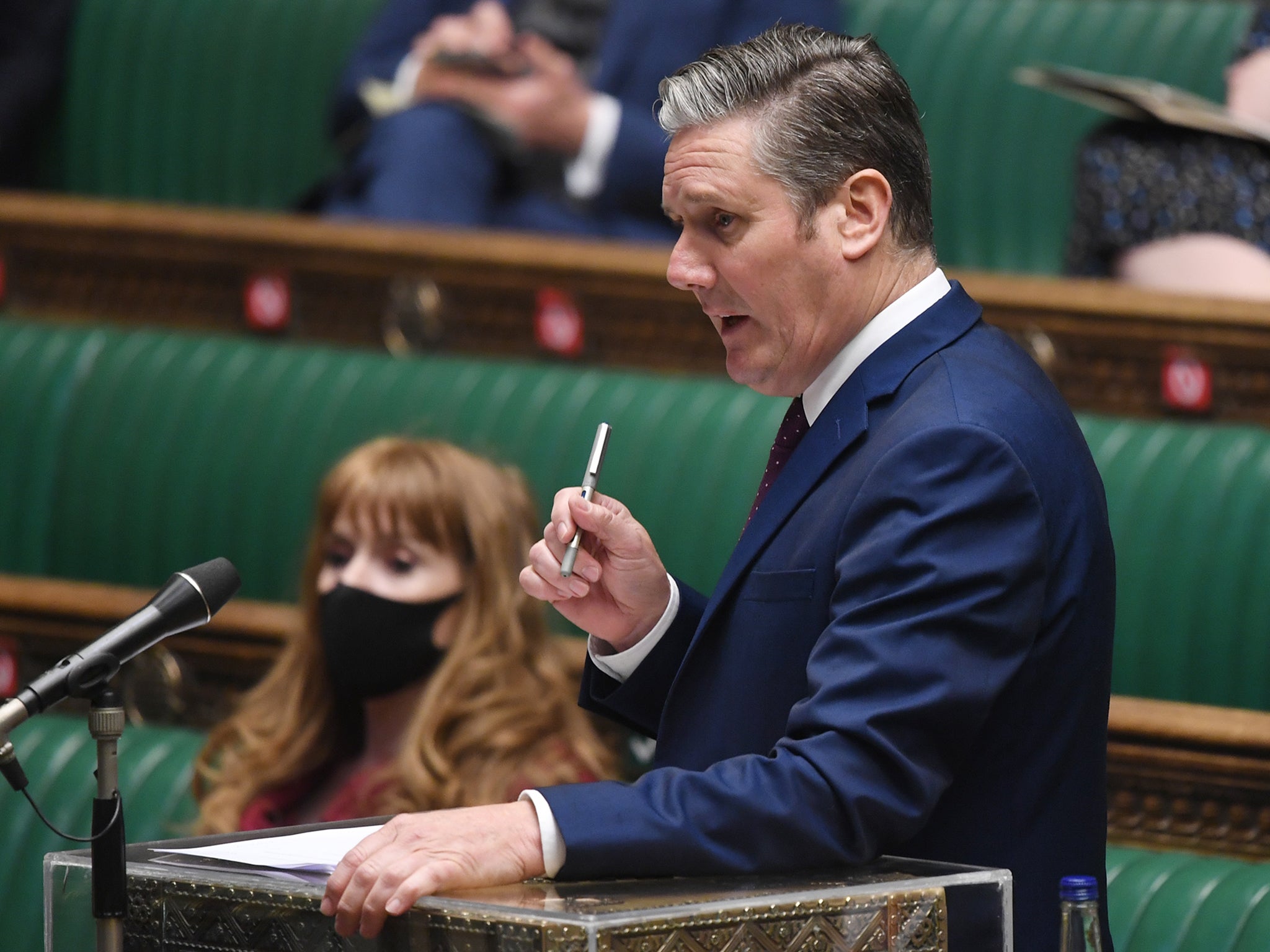Boris Johnson is making Keir Starmer’s job much harder by leaving him little room on policy
The Labour leader has to be bold, not bland, if he is going to stand a chance of winning the next general election, writes Andrew Grice


Boris Johnson is making Keir Starmer’s mammoth task even harder. Not just by winning elections; Johnson’s policies leave Labour little space and have the added bonus of fuelling the party’s internal turmoil.
The virtual renationalisation of the rail industry, a remarkable volte face for the Conservative Party, has reinforced the view of Labour left-wingers that Jeremy Corbyn won the argument. (Don’t mention the general election.) They view in the same light the Tories renouncing “austerity” and becoming a big-state, big-spending party during a coronavirus pandemic as demonstrating the need for another Corbyn flagship policy – free broadband.
This makes it harder for Starmer to wean Labour off a Corbyn agenda that voters judged too good to be true and undeliverable. In an underreported speech this week, Starmer made clear his wide-ranging policy review will not be based on the 2019 or 2017 Corbyn manifestos. He told Labour’s new centre-left group Progressive Britain the review would be about “answering the questions of the future”, adding pointedly: “You don’t go through a review like this by picking up the last document.”
The left cried betrayal, because it always does. It regards the 2017 manifesto as a tablet of stone; it helped Corbyn deprive the Tories of their overall majority and during last year’s Labour leadership contest, Starmer promised it would be his “foundational document.” No longer. Starmer vowed to “change our party to change Britain”, promising “transformative, modernising” change by an active Labour government in partnership with business.
I had a ringside seat for the modernisation that took place under Neil Kinnock and then Tony Blair. The first phase, under Kinnock from 1983-92, was painfully slow, and like pulling teeth. He inched a reluctant party towards credibility in the voters’ eyes and dumped the policies they were never going to accept. I once asked him whether Labour now supported unilateral or multilateral nuclear disarmament and he replied: “Both.”
Despite outward shows of strength, such as expelling Militant, Kinnock was privately plagued by self-doubt. But he took the bullets and, without getting much credit, got Labour more than halfway up its mountain, leaving Blair to complete the ascent. Although no one else could have won Labour such a landslide in 1997, Blair was luckier than Kinnock because John Major’s government had imploded after the 1992 election and was doomed to lose the next one.
The lessons for Starmer? Be bold not bland, display the courage to take on your party in a few symbolic battles the public notice. Update policies while remaining true to Labour’s values. Find a message that appeals to the mainstream majority, not just the red wall – a necessary precondition for recovery but not enough in itself. Starmer needs a big economic equivalent of Blair’s “tough on crime, tough on the causes of crime” mantra to encapsulate what Labour is for. It must be policy-rich, not a mere slogan.
It's good news for Labour that Starmer is not Blair. Painful change has to be driven by someone on the left, not the right, to ensure the party’s buy-in. While it suits some left-wingers to portray Starmer as a right-wing Blair Mk II, most party members know that is nonsense because Starmer is on the soft left, as Kinnock had to be to achieve what he did.
It took four election defeats before Labour returned to power in 1997. The party has now lost the last four but looks a million miles further away from office than it did in the mid-Nineties. Left-wingers didn’t like Blair’s medicine but were eventually desperate enough to win to swallow it and keep their heads down.
Ominously for Starmer, the left is not in the same place today. They want to be proved right about Corbyn’s programme, will not accept it is dead and have no desire to stop trashing the New Labour brand despite its electoral success, which doesn’t exactly help Starmer send a “change” message to the public.
Few Labour folk I speak to believe the party can win next time. Yet the game is not up because it might have a chance of securing a minority Labour government with the support of the Liberal Democrats and (whisper it softly) the Scottish National Party. If the Tories lost their majority, they would be kicked out, since no other party would prop them up (not even the Democratic Unionist Party).
However, even getting to that point is going to be very hard. Starmer is starting from Kinnock’s initial position at the foot of the mountain, not Blair’s. He is unlikely to get two election shots, as Kinnock did.
No wonder Peter Mandelson has advised Starmer: “I have been twice round this course, first with Neil Kinnock, then with Tony Blair. The electoral challenge we face now is far bigger than we faced in the 1980s.”
Join our commenting forum
Join thought-provoking conversations, follow other Independent readers and see their replies
Comments